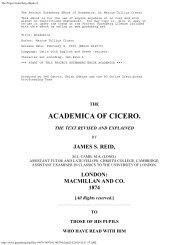From Farm House to the White House - 912 Freedom Library
From Farm House to the White House - 912 Freedom Library
From Farm House to the White House - 912 Freedom Library
You also want an ePaper? Increase the reach of your titles
YUMPU automatically turns print PDFs into web optimized ePapers that Google loves.
<strong>Farm</strong> <strong>House</strong> <strong>to</strong> <strong>the</strong> <strong>White</strong> <strong>House</strong>, by William M. Thayer 93<br />
Governor Dinwiddie was a conceited man, jealous of his own authority, and he did not like <strong>to</strong> be opposed by<br />
such a stripling as Colonel Washing<strong>to</strong>n, much less was he willing <strong>to</strong> abandon a project of his own by <strong>the</strong><br />
advice of an inferior officer. For this reason he adhered <strong>to</strong> his original plan, and instructed Washing<strong>to</strong>n <strong>to</strong> fill<br />
up his regiment <strong>to</strong> a thousand as soon as possible. With what feelings Washing<strong>to</strong>n under<strong>to</strong>ok this task may be<br />
learned from his letter <strong>to</strong> William Fairfax, Esq., president of Governor Dinwiddie's council:<br />
"I have orders <strong>to</strong> complete my regiment, and not a sixpence is sent for that purpose. Can it be imagined that<br />
subjects fit for this service, who have been so much impressed with and alarmed at <strong>the</strong> want of provisions,<br />
which was a main objection <strong>to</strong> enlisting before, will more readily engage now, without money, than <strong>the</strong>y did<br />
before with it?... To show you <strong>the</strong> state of <strong>the</strong> regiment, I have sent you a report, by which you will perceive<br />
what great deficiencies <strong>the</strong>re are of men, arms, tents, kettles, screws (which was a fatal want before),<br />
bayonets, car<strong>to</strong>uch-boxes, and everything else. Again, were our men ever so willing <strong>to</strong> go, for want of <strong>the</strong><br />
proper necessaries of life <strong>the</strong>y are now unable <strong>to</strong> do it. The chief part are almost naked, and scarcely a man<br />
has ei<strong>the</strong>r shoes, s<strong>to</strong>ckings, or a hat. These things <strong>the</strong> merchants will not credit <strong>the</strong>m for. The country has<br />
made no provision. They have no money <strong>the</strong>mselves, and it cannot be expected that <strong>the</strong> officers will engage<br />
for <strong>the</strong>m again, personally having suffered greatly on this head already.... There is not a man that has a blanket<br />
<strong>to</strong> secure him from cold or wet."<br />
That <strong>the</strong> conceited provincial governor was bent upon having his own way is evident from <strong>the</strong> fact that he<br />
wrote privately <strong>to</strong> England, and secured <strong>the</strong> passage of an act that made provincial officers of <strong>the</strong> army<br />
inferior <strong>to</strong> <strong>the</strong> English officers in rank. Under this act, Washing<strong>to</strong>n's rank would be that of captain instead of<br />
colonel.<br />
"Of course I shall not serve longer in <strong>the</strong> army under such an arrangement," said Washing<strong>to</strong>n <strong>to</strong> Mr. Fairfax.<br />
"Not that I covet higher rank, but self-respect requires me <strong>to</strong> throw up my commission."<br />
"For one, I can never blame you," replied Fairfax. "The animus of <strong>the</strong> thing is suited <strong>to</strong> discourage every<br />
soldier in <strong>the</strong> colony. If England expects <strong>the</strong> Colonies <strong>to</strong> fight her battles under such an arrangement, she will<br />
be greatly disappointed."<br />
"So I think," answered Washing<strong>to</strong>n; "and if I do not mistake <strong>the</strong> temper of <strong>the</strong> colonists, <strong>the</strong>y will never<br />
submit <strong>to</strong> such injustice; never. It is but <strong>the</strong> most reasonable thing that provincial troops should be placed<br />
upon <strong>the</strong> same footing as <strong>the</strong> king's. They should be as liberally provided for, and enjoy <strong>the</strong> opportunities of<br />
promotion equally with <strong>the</strong> o<strong>the</strong>rs."<br />
"Unless <strong>the</strong>y do, England cannot long claim colonies in North America," added Fairfax.<br />
As indicated by <strong>the</strong> foregoing, Washing<strong>to</strong>n returned his commission, and o<strong>the</strong>r officers did <strong>the</strong> same. The<br />
measure which Governor Dinwiddie adopted <strong>to</strong> bring Washing<strong>to</strong>n <strong>to</strong> terms, and put <strong>the</strong> army more directly<br />
under his own control, suddenly upset his authority. Instead of marching upon Fort Duquesne at once, a<br />
speedy abandonment of <strong>the</strong> enterprise was forced upon him. He could snub Washing<strong>to</strong>n, but he could not<br />
compel him <strong>to</strong> recruit and lead <strong>the</strong> army. Washing<strong>to</strong>n retired <strong>to</strong> private life at Mount Vernon.<br />
Governor Dinwiddie was never in such trouble before. Fort Duquesne haunted him in his sleep. The stripling<br />
of a colonel had outwitted his Excellency. What could he do?<br />
The British Government advised a confederacy of <strong>the</strong> Colonies, believing that "in union <strong>the</strong>re is strength."<br />
Accordingly, a delegate convention was called at Albany, "<strong>to</strong> form a league with <strong>the</strong> Six Nations of Indians,<br />
and <strong>to</strong> concert among <strong>the</strong>mselves a plan of united operations for defence against <strong>the</strong> common enemy." The<br />
New England States, New York, Pennsylvania, and Maryland accepted <strong>the</strong> proposition, and sent delegates <strong>to</strong><br />
<strong>the</strong> convention. A league was formed with <strong>the</strong> Six Nations, but <strong>the</strong> convention could not agree upon a plan of<br />
common defence acceptable both <strong>to</strong> <strong>the</strong> colonies and <strong>the</strong> British Government. Benjamin Franklin was a















